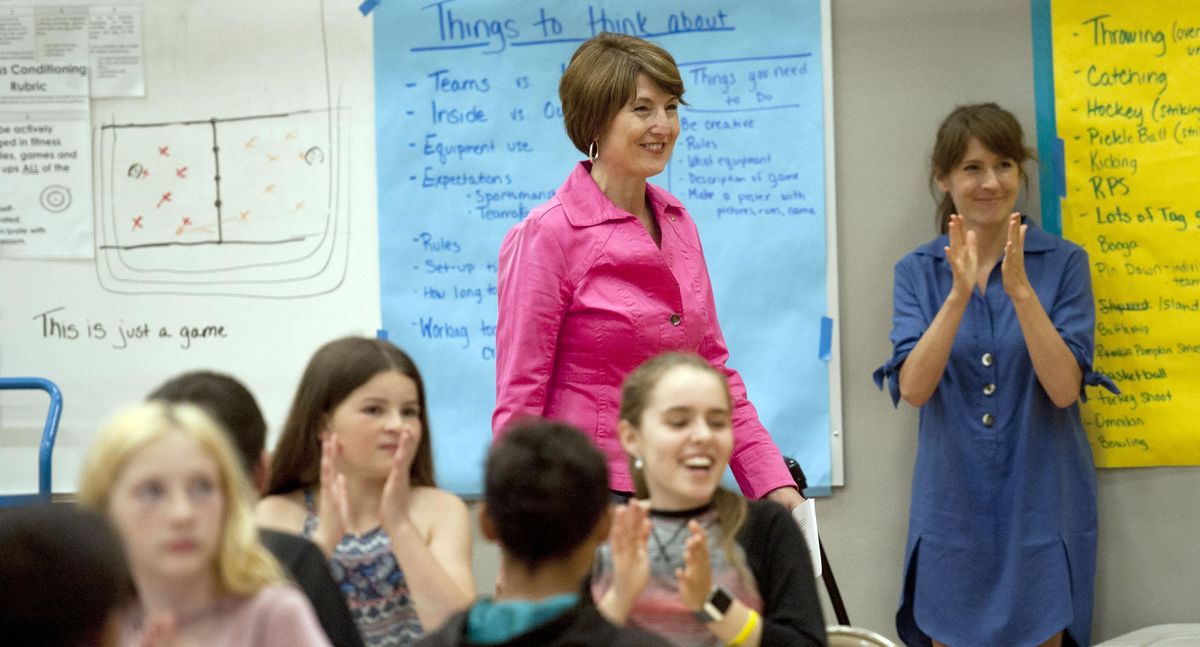Cathy McMorris Rodgers, Regal Elementary students learn the rudiments of coding

On Tuesday afternoon, the sixth-graders at Regal Elementary School didn’t really care that there’s good money to be made in computer science.
Or that U.S. Rep. Cathy McMorris Rodgers was in the house, sitting among them and learning about coding.
The kids just wanted to get at the bright-colored laptops sitting in front of them, the ones they were admonished not to open until the grown-ups had finished talking. And talking – only for a few minutes, but it seemed longer to eager minds ready to be unleashed.
The occasion was the Google CS First Roadshow, a national project that teaches kids about the importance of STEM (Science, Technology, Engineering and Math) education.
The hourlong presentation encourages elementary school students to develop an interest in computer science while learning coding and problem-solving skills.

The operative word is coding, which experts from Google demonstrated on a large screen. Instead of complex commands, the coding was simplified into icons.
The education happens interactively – hence the dozens of impatient fingers strumming the tables in the Regal gymnasium in northeast Spokane.
Nanoseconds after given the command, those fingers pried open their machines and got to work, though it didn’t seem like it.
“They have laptops in class, but their intensity level peaks immediately when they see new technology,” teacher Danielle Doornink said.
“And of course this isn’t me teaching them,” Doornink added with a smile.
Even on a warm spring day, this was more fun than recess.
Following the instructions from the Google experts, the entire sixth-grade class got down to the business of telling a story about a sailboat.
They created the boat, the waves and even a few remarkable characters, including a pirate and a sea monster.
For many kids in lower-income neighborhoods, laptops are found only in school. Most know only cellphones.
“The only thing they think of is games and social media,” Doornink said. “This is a much broader scope, instead of tech that gets taken away from them when they misbehave.”
Sadly, the fun ended after one hour. McMorris Rodgers departed a few minutes earlier, full of praise for Google “for making this a priority to expose kids to coding, to introduce coding to them and to help connect what coding would mean to them as far as a job and having an impact on our community.”
That may come later, according to Principal Patricia Kannberg, who pointed out that last year in the United States, 500,000 computer-related jobs went unfilled. Also, that those jobs pay on average 40% more than nonscience positions.
In the meantime, there’s more fun to be had. This summer, school districts across the region are hosting summer STEM camps.
At Shaw Middle School, the fun will last two months, from June 17 to Aug. 16. The program is free and open to children ages 4-16 who attend Arlington, Bemiss, Cooper, Lidgerwood, Logan, Longfellow, Regal, Stevens and Whitman elementary schools.
Breakfast and lunch will be provided.
Also eligible are students from Shaw and Garry middle schools, Rogers High School and the Spokane International Academy.